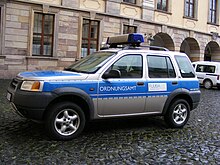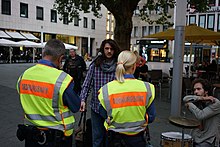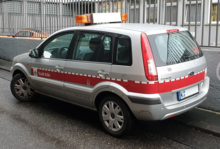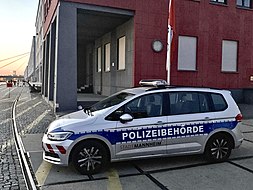Public order office
The Ordnungsamt (often abbreviated as OA ) is the name for an organizational unit within local government in Germany and Austria , in which the task of averting threats to public safety or order is usually performed, unless these are assigned to special authorities by state law. A distinction must be made between the designations of the actual authority and the visible enforcement service, which do not have to appear under the same designation.
Situation in Germany and Austria
Germany
The regulatory office as an authority

The responsibilities of the regulatory office in Germany are very different due to country-specific characteristics, the number of inhabitants in the municipality and the municipality's organizational sovereignty in the individual municipalities. The regulatory office not only performs - more or less comprehensively - the tasks of the local regulatory authority, but almost always also other tasks that are assigned to specific regulatory authorities under state law. In addition to the municipalities, the administrative districts or the independent cities perform the tasks of the district regulatory authority. The following tasks are often summarized in the public order office:
- commercial office
- noise protection
- Funeral services
- Prosecution of general administrative offenses
- Initiation of the procedure for the placement of mentally ill people
- Weaponry
- Market system
- Monitoring of stationary traffic
- Immigration
- Citizenships and name changes under public law
- Registration office
- Vehicle registration
- Driver's license office
- Homelessness
- Animal welfare
In a broader sense, you can also
be assigned to the regulatory office to deal with.
According to the model administrative structure plan of the KGSt ( communal community center for administrative management ), it is assigned to the legal, security and regulatory administration area with order number 32.
The public order office as an enforcement service

Many cities have placed the enforcement service of the regulatory authority in the regulatory office, which appear in accordance with the statutory provisions of the respective countries. In Germany, the collective term for the uniformed enforcement service of the communal regulatory authority is the Kommunaler Ordnungsdienst (KOD). The legal entity of the regulatory office of a municipality is the municipality as a materially obliged body .
The structure of the municipal security services is very different. The powers are - at least in North Rhine-Westphalia (NRW) and in Baden-Württemberg - very far-reaching, but are sometimes exercised differently in the individual cities and municipalities. In many municipalities there is also close cooperation with the respective state police (double patrol, joint guard).
At the annual federal congress on communal order, the basic developments in this area (increase in tasks, armament, professionalization) are discussed.
Training and equipment

There are no uniform standards in training, equipment, armament, performance of duties and uniforms, but there have been attempts in this direction. Since 2014 there has been a state-wide training for the KOD in Baden-Württemberg, which corresponds in the training content to the middle police enforcement service. The KOD training is divided into 5 training units (basic training, internship I, advanced course, internship II and a final course). Among other things, general and special police law , Owi law, criminal procedure law , criminal law , administrative law, road traffic law , political science, psychology , service law , gun law , operational training / access training, etc. both in theory and practice (SHT) are taught here. At the end of this training there is a corresponding written and practical exam.
The municipality is also responsible for equipping the employees of the public order office. Employees of the authorities can be equipped with radios, protective gloves, pepper spray, handcuffs, batons and even firearms, so that the equipment is similar to that of the police. The public order offices in Frankfurt am Main, Stuttgart and Dresden have firearms.
The establishment of municipal security services can be seen as part of the current restructuring of the German police force. This reverses the unification efforts of the 1970s in police law, which have led to largely uniform police laws and police uniforms as well as to the de-municipalization of the police. Ultimately, this development may end with the restoration of the municipal police force in Germany.
The KOD of the cities and districts takes on the tasks in the context of public safety and order that the police of the federal states have previously performed on a subsidiary (subordinate) basis. This is the predominant part of the administrative offenses, such as B. disturbances of the peace, nuisance of the general public, which falls within the competence of the cities and counties. They are authorized to enforce their lawful measures with coercion, ie under certain circumstances also with force against persons. The regulatory authorities act in conjunction with the police act applies here, at least this applies to the state of North Rhine-Westphalia.
The situation in the countries
In Baden-Wuerttemberg and Saxony there is no regulatory authority law, but the police law, as these states have opted for a so-called unitary system in police law. The term police therefore also includes the police authority / local police authority (corresponds to the regulatory authority / regulatory authority in other countries), which municipal prison staff or a municipal security service (KOD) can use ( term police ). In most cases, the KOD has very far-reaching police powers and therefore, according to Section 80 of the Police Act, the position of police officers when performing their duties. In this sense, the KOD can be seen as a kind of city police . In several large cities in Saxony and Baden-Württemberg, the municipal enforcement service uses the designation police authority on uniforms and vehicles .
In the meantime, the municipal enforcement officers in various cities wear shoulder straps with white stars. The background to this is that they have completed training (municipal security service).
In Hesse , the terms Stadtpolizei , Kommunalpolizei and Ordnungspolizei can also be used since 2017 , as is the case in Frankfurt am Main with the Stadtpolizei Frankfurt or in Darmstadt with the Kommunalpolizei Darmstadt . In NRW, too, the renaming of the Ordnungsamt to the City Police is being considered.
In North Rhine-Westphalia , municipal security services have been set up since the late 1990s, primarily in the larger cities of the state, as a reaction of the cities and municipalities to increasing security problems in the urban environment (open drug scene, neglect tendencies, street crime, insufficient city cleanliness) and at the same time dwindling presence of the state police can be assessed.
In the state of Bremen , the tasks of the public order office are carried out by the civil and public order office . Organizationally it is separated from the police and in the administrative structure in the city of Bremen it is assigned to the legal, security and regulatory administration area at the Senator for the Interior and in Bremerhaven to the magistrate.
Austria
In Austria public order offices are set up under this name, both as an authority and as an enforcement service, in only a few cities. As a municipal authority, the area of responsibility is often divided into several departments, depending on the municipality . As an enforcement service, many cities prefer to set up city police that also enforce city ordinances. These city police are on an equal footing with the federal police in the respective municipality and are armed.
Cities with a state police department as the security authority of first instance are not allowed to set up city police according to the provisions of the Austrian constitution . These are all state capitals except Bregenz and a few other larger cities that are forced to set up authorities with limited powers. The officers act as public inspection and may organ penal orders exhibit and displays. These are the following field service enforcement services:
- Ordnungsamt Bischofshofen : There is a political desire to set up a city police here.
- Ordnungswache Graz with currently 56 employees (as of 2019)
- Ordnungsamt Klagenfurt , the employees carry pepper spray guns and a police-like uniform with the inscription "ORDNUNGSAMT".
- Mobile monitoring group (MÜG) Innsbruck with currently 41 employees (as of 2019). The officers are equipped with stab protection vests and pepper spray pistols and wear police-like uniforms with the words "MAGISTRAT" on them.
- Order station Wels
- Regulatory Office Salzburg
In Linz the Ordnungsamt was not set up by the city administration, but as a GmbH and is called Ordnungsdienst ( Ordnungsdienst der Stadt Linz GmbH ). The 30 employees (as of 2019) are uniformed and some are armed with pepper sprays.
Security services in Vienna
In Vienna , several security services were set up according to the responsibilities of the various municipal departments:
- Regulatory advisor from Wiener Wohnen : Responsibility in the area of Viennese municipal housing : monitoring of the "Wiener Reinhaltegesetz", measures against noise, illegal parking etc.
-
Parking monitoring group (PÜG) of the City of Vienna under the service and technical supervision of the State Police Directorate Vienna . The PÜG officers wear blue uniforms labeled "STRASSENAUFSICHT" and are colloquially referred to as "park sheriffs". Currently (as of 2019) there are over 520 PÜG employees and 22 assigned officers of the Federal Police . The tasks of the PÜG include:
- the monitoring of all stationary traffic
- the parking space management
- the search for vehicles searched by the police or uninsured
During Corona - pandemic in 2020, the officials of the PÜG were by the Federal Police temporarily to monitor the Federal Gardens In Vienna.
- WasteWatcher of Magistratsabteilung 48 (MA48) : Monitoring of the "Viennese Reinhaltegesetz ", the focus is on bulky waste, dog waste, cigarette butts, illegally parked shopping carts and the throwing away of leftovers
As a special feature, as it can neither be classified as a municipal police nor as a security service, the Rathauswache has existed in Vienna since 1927 as a special organizational unit of the Vienna professional fire brigade , which was founded as an armed task force as a result of the Palace of Justice fire . In addition to fire protection tasks, the town hall guard is responsible for protecting people and property in the town hall and in all of the municipal offices in Vienna. Another area of responsibility is the issuing of “emergency passports”, i.e. passports that are urgently needed outside of the opening times of the passport offices.
Rest of Europe
Netherlands
In the Netherlands this service is called Handhaving (Dutch for "enforcement") or Handhaving en Toezicht (Dutch for "enforcement and surveillance"), and in most cases the police-like uniforms also bear this label. The officials of these city authorities actively address people who violate city ordinances and are present in public places. The tasks of handhaving include:
- Take action in the event of harassment from drug use or alcohol abuse
- Review of permits in the field of prostitution, detection of abuses such as human trafficking
- Increase in objective and subjective safety in public spaces and in public transport
- towing dangerously parked vehicles
Great Britain
In Great Britain the officials of the public order offices are called Warden (English for "overseer"). They enforce all regulations not to be implemented by the police.
Poland
In Poland , the Straż miejska (Polish for "city watch") takes care of public order. Their tasks include identity checks, prosecution of administrative offenses, writing parking tickets, towing wrongly parked vehicles and other offenses that do not directly require the use of the police. However, this can be called in by the city guard at any time.
rest of the world
The establishment of authorities to enforce local regulations is widespread in the member states of the Commonwealth of Nations such as Australia , Canada and New Zealand due to the British legal and administrative tradition. Similar to Germany, these are law enforcement authorities of a municipality, a district or a regional district, which are tasked with the enforcement of non-criminal ordinances, rules, laws, statutes or regulations issued by local governments.
Australia
In Australia, the terms Law Enforcement Officer (English for "law enforcement officer"), Shire Ranger (English for "field guard") or Local Laws Officer (English for "local law officer") are designated for officials in the field service of the general local public order office. In addition, there are also the designations Traffic Officer for officials of parking space management, as well as the Animal Management Officer in the field of wild animals for narrower areas of application .
Canada
The legal structure of the establishment of the regulatory authorities is incumbent on the provinces in Canada. A distinction must be made here between "normal" community officials and the (community) peace officer (English for "(community) law enforcement officers "), since only the sworn in "peace officer" may act in a sovereign manner.

New Zealand
In New Zealand, law enforcement officers are employed at the district or city level. The employees are responsible for certain tasks: enforcement services, animal control, stationary traffic, noise protection and illegal waste disposal. The responsible officials are given task-related powers. Assaults on the law enforcement officers are the order of the day, which is why security measures, such as wearing body cams , have been introduced.
United States
In the United States , the term Code Enforcement Officer is common, but the responsibilities are much more limited than in Canada, for example, and more like the position of a clerk.
People's Republic of China

In 2002, a "Municipal Administration and Law Enforcement Office" was opened in every city in China , usually shortened to Chengguan (Chinese: 城管; pinyin: Chéngguǎn). This regulatory office is responsible for enforcing the city's ordinances. This includes the appearance of the city, the environment, sanitary facilities, occupational safety, control of pollution and pollution, health supervision and includes the enforcement of municipal regulations in industry and trade, environmental protection and water.
See also
literature
- Abt, Jan et al. Dynamic arrangements of urban security - actors, cultures, images , Springer VS, Wiesbaden, 2014
- Balzer, Christoph Kommunale Ordnungsdienste , Kommunal- und Schul-Verlag, Wiesbaden, 2019
- Beck, David The re-municipalization of police activities by means of municipal security services - a case analysis using the example of Baden-Württemberg , Verlag für Polizeiwissenschaft, Frankfurt am Main, 2018
- Donnelly, Daniel Municipal Policing in the European Union - Comparative Perspectives , Palgrave Macmillan, Houndmills, 2013
- Eikenaar, Teun Municipal disorder policing - Dealing with annoyances in public places , Eleven International Publishing, Den Haag, 2017
- Terpstra, Jan et al. Who Patrols the Streets? , Eleven International Publishing, The Hague, 2013
- Tuchscherer, Lisa Stadtpolizei instead of Police , Duncker & Humblot, Berlin, 2017
Web links
Individual evidence
- ↑ Duties and rights: What the public order office is allowed to do. Retrieved July 12, 2020 .
- ^ The Ordnungsamt - function and tasks. Retrieved July 12, 2020 .
- ↑ http://www.halteverbot123.de/ordnungsamt-lösungen-und-befugnisse.html
- ↑ "You are only the regulatory office". Die Welt, February 19, 2019, accessed June 21, 2020 .
- ↑ "City Police" takes stock: The weapon should stay. Offenbach Post, June 25, 2013, accessed on June 21, 2020 .
- ↑ Call for help from the regulatory agencies. Kommunal, February 1, 2019, accessed June 21, 2020 .
- ↑ State Parliament of Baden-Württemberg: Statement by the Ministry of the Interior, Digitization and Migration of March 28, 2018
- ↑ The new policeman - politics. Retrieved April 29, 2020 .
- ^ Municipal security service of the city of Karlsruhe in the Stadtwiki Karlsruhe. https://ka.stadtwiki.net/Kommunaler_Ordnungsdienst
- ^ Special security service of the city of Mannheim in the Rhein-Neckar-Wiki. https://rhein-neckar-wiki.de/Kommunaler_Ordnungsdienst_Mannheim
- ↑ https://www.krone.at/1680018
- ↑ http://www.bischofshofen.at/stadtamt/verwaltung/siegfried-lehrl-bernhard-loibl-ordnungsamt.html
- ↑ http://www.bischofshofen.at/fileadmin/chef-redakteure/dokumente/Zeitung/Zeitung_Sept_2006.pdf
- ↑ https://www.mein Bezirk.at/pongau/politik/gemeindewachkoerper-fuer-mehr-polizeipraesenz-d2419016.html
- ↑ https://www.derstandard.at/story/2000098190895/kommunale-stadtwachen-kosten-millionen
- ↑ http://www.klagenfurt.at/rathaus-direkt/buergerservicebuero/ordnungsamt.html
- ↑ http://www.klagenfurt.at/rathaus-direkt/medien-presse/stadtpresse-aussendung/2017-1/mai/unnamed-1.html
- ↑ https://www.krone.at/1680018
- ↑ https://www.innsbruck.gv.at/data.cfm?vpath=redaktion/ma_ii/allgemeine_sicherheit_und_veranstaltungen/dokumente11/folder-neu
- ↑ https://www.derstandard.at/story/2000098190895/kommunale-stadtwachen-kosten-millionen
- ↑ https://www.wels.gv.at/news/detail/mehr-kompetenzen-fuer-die-ordnungswache/
- ↑ New security guard in Wels. In: ORF. Retrieved December 4, 2010 .
- ↑ https://www.krone.at/2035180
- ↑ https://www.stadt-salzburg.at/org-db/ORGTEBW?TODO=TEBSYAM&ORG=OU31
- ^ City guard: Linz law enforcement officers sworn in. In: Upper Austrian news. Retrieved December 4, 2010 .
- ↑ https://www.wienerwohnen.at/mieterin/lebenimgemeindebau/ordnungsberater.html
- ↑ https://www.wien.gv.at/verkehr/parken/strafen/ueberwachungsorgane.html
- ↑ https://www.wien.gv.at/verkehr/parken/strafen /ueberwachungsorgane.html
- ↑ https://www.krone.at/1621930
- ↑ https://www.polizei.gv.at/wien/start.aspx?nwid=596C4F4645644A47706E4D3D&ctrl=3734335266674D385951343D&nwo=0
- ↑ https://www.wienerzeitung.at/nachrichten/panorama/wien/859005-Mehr-als-nur-ein-Parksheriff.html
- ↑ https://wien.orf.at/stories/3043747/
- ↑ https://www.wien.gv.at/umwelt/ma48/sauberestadt/strassenreinigung/wastewatcher.html
- ↑ https://www.rudutrecht.nl/handhaving/
- ↑ https://www.amsterdam.nl/bestuur-organisatie/organisatie/dienstverlening/handhaving-toezicht/
- ↑ http://www.chinadaily.com.cn/opinion/2006-08/17/content_666765.htm
- ↑ https://www.scmp.com/news/china-insider/article/1491428/chengguan-officials-seriously-injured-after-assault-large-crowd
- ↑ https://www.hrw.org/report/2012/05/23/beat-him-take-everything-away/abuses-chinas-chengguan-para-police#
- ↑ https://web.archive.org/web/20081121151344/http://www.cgj.suzhou.gov.cn/english01.shtml


